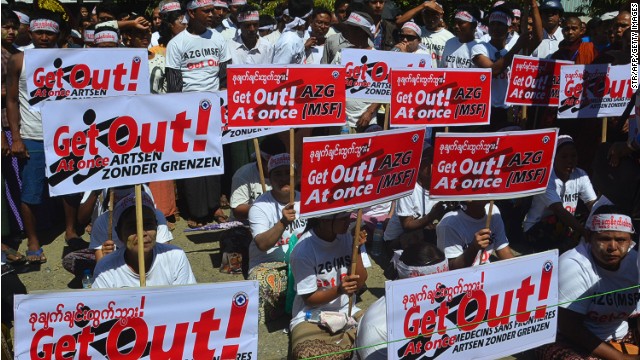
Protesters in Rakhine's state capital, Sittwe, call for Medecins Sans Frontieres to leave on February 22.
- Medecins Sans Frontieres has been banned from Rakhine State, Myanmar
- Myanmar’s government accuses it of bias towards the persecuted Rohingya minority
- The NGO says it provides care regardless of religious or ethnic affiliation
- Rakhine State is home to the majority of Myanmar’s Rohingya, a stateless Muslim group
Medicins Sans Frontieres has been banned from operating in Myanmar’s strife-torn Rakhine State, following official accusations the aid organization is biased towards the state’s persecuted Rohingya minority.
The international medical NGO, also known as Doctors Without Borders, was last week banned from the southeast Asian nation, where it provides essential healthcare to tens of thousands of patients and has operated for 22 years.
On Saturday, the organization announced that the government had allowed it to resume operations in a number of regions, but not in Rakhine State, where the majority of the predominantly Buddhist country’s disenfranchised Muslim Rohingya minority is concentrated.
Since 2012, the state, home to an estimated 800,000 stateless Rohingya, has seen outbreaks of communal violence that have killed hundreds and left 140,000 displaced.
In a statement, MSF said it was “deeply shocked by this unilateral decision.
As the major NGO healthcare provider in Rakhine, it ran clinics in nine townships across the state, “treating anyone who was unable to access the medical care they required,” including tens of thousands of vulnerable people who displaced into camps by recurrent communal violence.
But Ye Htut, spokesman for Myanmar President Thein Sein, said the organization had been banned from the state for consistently showing favoritism towards the Rohingya — a stateless group Myanmar’s government does not recognize as a legitimate ethnic minority, but regards instead as interlopers from neighboring Bangladesh.
“MSF’s foreign and local staff in Rakhine have created a lot of problems because they are not following their core principle of neutrality and impartiality,” he said.
“When they give treatment to people they prefer to emphasize on the Bengali people. Sometimes Rakhine people visit their clinic seeking help and they’re refused. They allow transportation of Bengali patients to the nearby hospital but they fail to provide the same service to the Rakhine people.”
The perceived bias had “created a lot of tension in the local community,” he said. Nine days ago, hundreds protested against the NGO in Sittwe, the state capital.
MSF would not reveal the reasons it had been ordered to halt operations, citing the sensitivity of the situation, but responded to the accusation of bias with a statement that “all MSF services are provided based on medical need only, regardless of ethnicity, religion or any other factor.”
Reports have speculated that the ban was triggered by MSF statements contradicting the official government’s account of a recent massacre alleged to have occurred in the Rakhine township of Maungdaw in January.
The U.N. and human rights groups claim at least 40 Rohingya Muslims were killed by state security forces and ethnic Rakhine, with the MSF claiming it treated 22 people in the area for weapon wounds.
But a government inquiry stated that only one police officer had died.
Htut said the disagreement over the Maungdaw massacre was “not a major issue,” but had been the “final straw” for the Rakhine state government when it came to the NGO.
“The state government and local people think the MSF is intentionally creating tension in the community by spreading baseless information like this,” he said.
He also accused the organization of breaching the terms of its Memorandum of Understanding to operate in Myanmar by denying officials access to its clinic, and by employing “nearly 40” foreign staff in the state when it was allowed 19.
MSF did not respond to the latter allegations, but said it was “extremely concerned about the fate of tens of thousands of vulnerable people in Rakhine state who currently face a humanitarian medical crisis.”
It said it was continuing talks with Myanmar’s government to ensure life-saving services could continue in the state.



Leave a reply